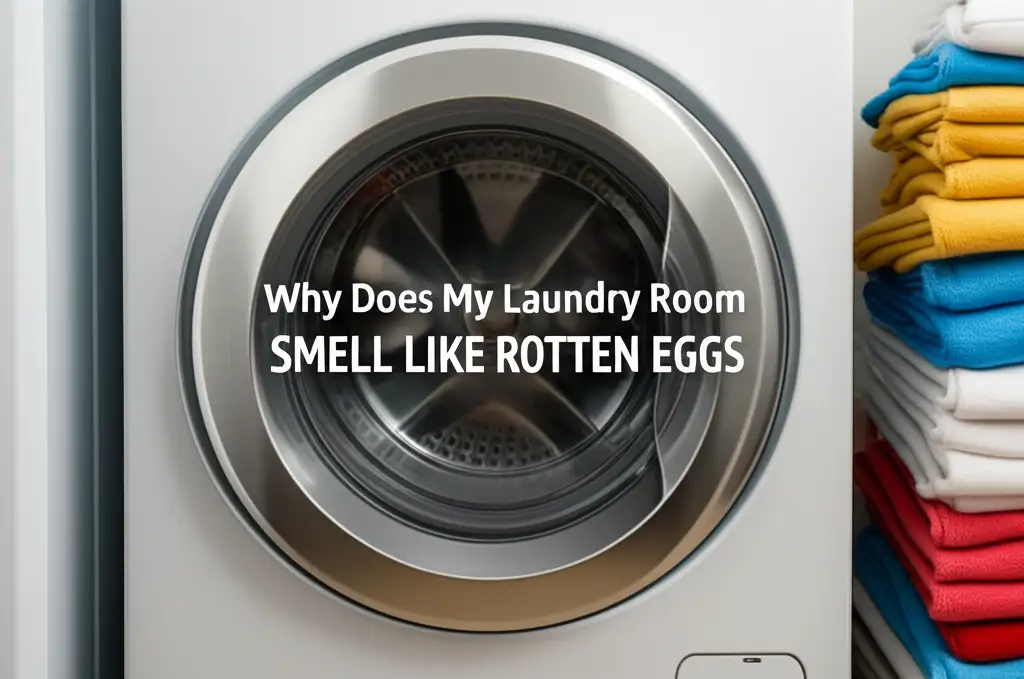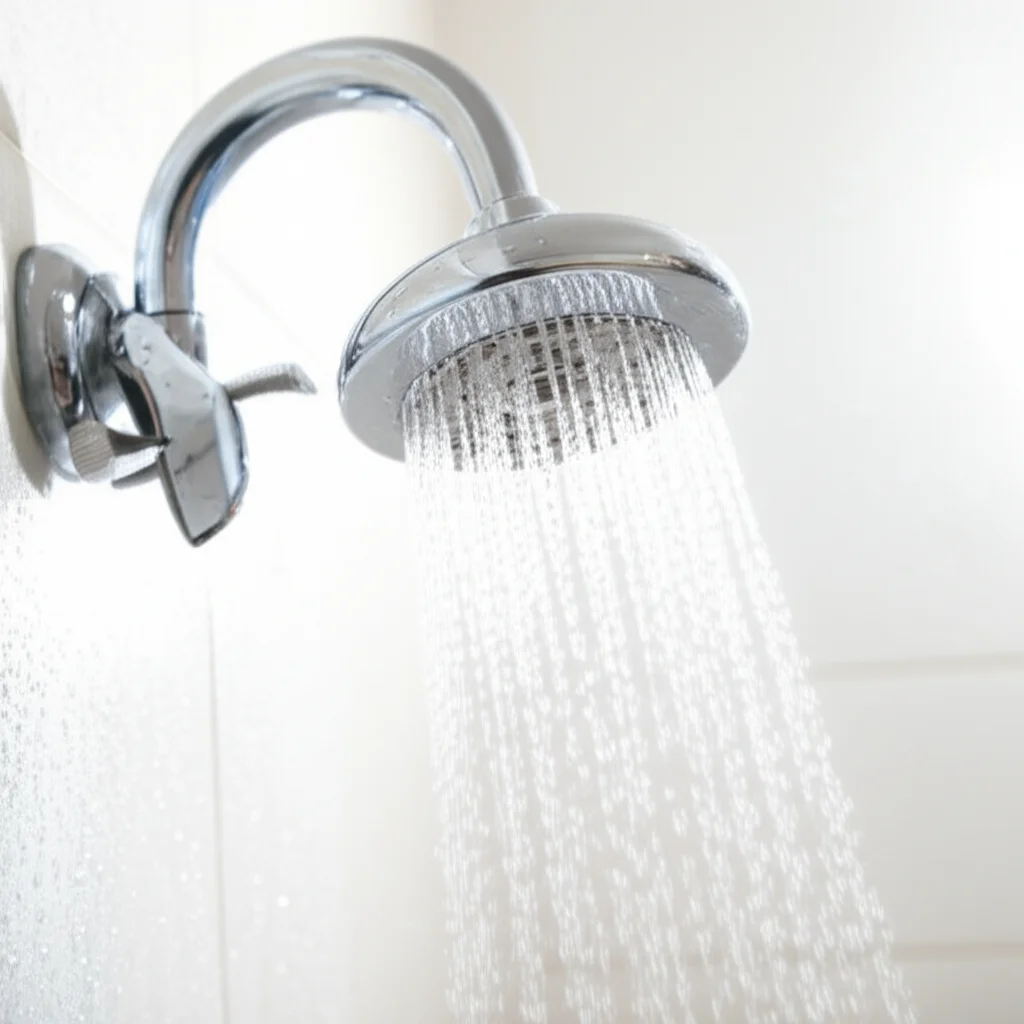· Davia Murnell · Home Maintenance · 21 min read
Why Does My Laundry Room Smell Like Rotten Eggs

The pungent odor of rotten eggs wafting from your laundry room is certainly an unwelcome surprise. This distinctive smell, often likened to sulfur, signals that something is amiss. It disrupts the cleanliness you expect from a laundry space. This problem can be puzzling. You might wonder if it comes from your clothes, the machines, or something else entirely.
Dealing with a rotten egg smell in your laundry room needs careful investigation. There are many possible sources. Some are simple fixes, while others require professional help. Ignoring the smell is not an option. It can point to health hazards, like gas leaks. I have dealt with mysterious household odors myself. I understand how frustrating this can be. This guide will help you identify the culprit. We will then give you actionable steps to eliminate the smell. We will also discuss how to prevent it from returning. By the end, your laundry room will smell fresh and clean again.
Takeaway
Eliminating a rotten egg smell in your laundry room requires a systematic approach.
- Check Your Washing Machine: Often, detergent buildup or mold causes odors.
- Inspect Drains and P-traps: Dry P-traps allow sewer gas to enter your home.
- Consider Plumbing Vent Issues: Blocked vents can also cause sewer gas to escape.
- Look for Mold and Mildew: Hidden moisture can lead to musty, sulfur-like smells.
- Test Your Water Heater: An anode rod issue in the water heater can produce this odor.
- Address All Sources: Combine cleaning, plumbing checks, and ventilation improvements for lasting freshness.
A rotten egg smell in your laundry room usually indicates the presence of hydrogen sulfide gas. This gas often comes from issues with your washing machine, dry plumbing P-traps, blocked vent pipes, or even contaminated water from your water heater. Addressing these specific sources helps you get rid of the odor.
Pinpointing the Rotten Egg Smell in Your Laundry Room
Finding the source of a rotten egg smell in your laundry room is the first step toward a fresh home. This distinctive odor signals hydrogen sulfide gas. This gas can come from several places. Understanding these common culprits helps you narrow down the problem. We want to identify the exact cause quickly.
You might notice the smell only when running the washing machine. Or, it could be constant. This difference provides an important clue. A smell tied to washing cycles often points to the machine itself. A persistent smell suggests a plumbing or water supply issue. You might also notice the smell is stronger near a drain. This points you toward specific plumbing components. Begin by observing when and where the odor is strongest. This initial observation saves you time and effort. I always start my investigations this way. This is because it helps me focus my efforts.
Hydrogen sulfide gas is naturally present in sewers and can form in stagnant water. It smells like rotten eggs, even at low concentrations. While small amounts are usually harmless, large amounts can be dangerous. Knowing this fact emphasizes the importance of fixing the problem promptly. Do not ignore this smell. It is your home telling you something is wrong. We will explore each possible source in detail. This ensures you cover all bases.
Washing Machine Woes: A Common Source of Sulfur Odor
Your washing machine is a frequent culprit for that rotten egg smell. Over time, residue from detergent, fabric softener, and dirt builds up inside the machine. This creates a breeding ground for bacteria and mold. These microorganisms thrive in the warm, damp environment of your washer. They produce hydrogen sulfide gas as a byproduct. This causes the foul odor. This is especially common in front-loading machines. Their airtight seals can trap moisture.
Another common issue is leaving wet clothes inside the machine. This quickly promotes mold and mildew growth. Even a short time can be enough. The smell transfers to your clothes and spreads throughout the laundry room. Neglecting regular cleaning of your washing machine also contributes to this problem. Many people simply use their washer without thinking about cleaning it. However, it needs attention just like other appliances.
To combat this, you need to clean your washing machine regularly. Use a specialized washing machine cleaner or a mixture of vinegar and baking soda. Run a hot water cycle with these cleaners. This helps flush out residue and kill bacteria. For front-loaders, pay attention to the rubber gasket around the door. Mold often collects here. Wiping it down after each wash cycle helps prevent buildup. My own washing machine used to smell. Regular cleaning completely solved the problem. It truly makes a big difference.
Cleaning Your Washing Machine to Remove Odors
Cleaning your washing machine is crucial. This helps eliminate rotten egg smells. It is a simple process. First, remove any clothes from the machine. Then, add two cups of white vinegar to the detergent dispenser. You can also pour it directly into the drum. Next, sprinkle half a cup of baking soda into the drum. This combination works to break down grime and kill bacteria.
Run the machine on its hottest cycle. Choose a “tub clean” or “self-clean” setting if your washer has one. If not, a regular hot cycle will do. This cycle flushes out the residue and odor-causing bacteria. After the cycle finishes, wipe down the inside of the drum with a clean cloth. Pay close attention to the rubber gasket on front-load washers. Mold often hides there. Pull back the folds of the gasket to clean thoroughly. Use an old toothbrush for stubborn areas.
It is helpful to leave the washer door ajar between washes. This allows air to circulate. It prevents moisture buildup. Moisture creates a perfect environment for mold and mildew. This simple habit keeps your machine fresh. You can find more detailed instructions on how to clean your washing machine that smells like rotten eggs and general tips on how to clean a laundry machine. For persistent smells, follow specific advice on how to clean a washer smell to ensure all odor sources are addressed.
Plumbing Predicaments: Drains and Vents as Culprits
Plumbing issues are a major reason for rotten egg smells in your laundry room. The most common culprit is a dry P-trap. The P-trap is the U-shaped pipe under your drain. It holds a small amount of water. This water creates a seal. The seal prevents sewer gases from entering your home. If a drain in your laundry room is rarely used, the water in its P-trap can evaporate. This breaks the seal. It allows hydrogen sulfide gas to escape directly from the sewer system into your room.
Another significant plumbing issue involves blocked or improperly installed vent pipes. Plumbing systems need vents. These vents allow air into the pipes. They help wastewater flow properly. They also allow sewer gases to escape safely through the roof. If a vent pipe becomes clogged with debris, like leaves or bird nests, or if it is improperly installed, sewer gases can become trapped. These gases then find their way out through the nearest drain. This includes the laundry room drain. You will notice a strong, unpleasant odor.
Even a small crack or leak in a drain pipe can release sewer gas. This happens behind walls or under floors. The smell might seem to come from everywhere. Regularly running water down all laundry room drains helps keep P-traps full. Inspecting visible pipes for leaks also helps. If the smell persists after checking drains, consider calling a plumber. They can inspect your vent system. They can also check for hidden leaks. Addressing these plumbing issues promptly is essential. It ensures your home remains safe and free from unpleasant odors.
Diagnosing Drain and Vent Issues
To diagnose drain issues, first, identify all drains in your laundry room. This includes the washing machine drain hose, floor drains, and utility sink drains. Pour a gallon of water down each unused drain. This refills the P-trap. Wait a few hours. See if the smell goes away. If it does, a dry P-trap was the problem. This is a common and easy fix.
If the smell remains, the issue might be more complex. A clog deeper in the drain line can trap organic matter. This matter then decomposes. This produces hydrogen sulfide gas. You might try a drain cleaner or a mixture of baking soda and vinegar. Pour it down the drain. Let it sit for an hour. Then flush with hot water. Avoid harsh chemical cleaners often. They can damage pipes.
Vent pipe problems are harder to diagnose yourself. You might hear gurgling sounds from drains. This can be a sign of a blocked vent. If you suspect a vent issue, it is best to call a professional plumber. They have the tools to inspect vent pipes. They can clear blockages safely. Regular home maintenance, including proper cleaning routines, helps with overall air quality. Consider general advice from resources like how to deep clean your house room by room. This helps ensure good airflow and reduces odors throughout your home.
Mold, Mildew, and Moisture: Hidden Odor Producers
Mold and mildew thrive in damp, dark environments. Your laundry room provides an ideal breeding ground for these fungi. They produce a musty, earthy smell. Sometimes, this odor can also have a sulfuric, rotten egg undertone. This happens when certain types of bacteria, which produce hydrogen sulfide, grow alongside the mold. This is especially true if the moisture source also contains organic matter.
Common areas for mold and mildew growth in the laundry room include behind washing machines, under utility sinks, or on damp walls. Leaky pipes, overflowing washing machines, or poor ventilation can all contribute to excessive moisture. This moisture leads to mold growth. Lint traps that are not cleaned regularly can also become damp. This allows mold to grow there. Lint can hold a lot of moisture.
To address this, find and fix all sources of moisture. Repair leaky pipes immediately. Ensure proper drainage for your washing machine. Improve ventilation in the laundry room. Use an exhaust fan during and after laundry cycles. You can also open a window if available. Clean visible mold with a bleach solution or a mold remover. For extensive mold growth, professional help may be necessary. Ignoring mold can lead to respiratory issues. It also keeps the bad smells.
Identifying and Eliminating Mold and Mildew
Identifying mold and mildew involves a visual inspection and a smell test. Look for discolored patches, typically black, green, or white, on walls, ceilings, or even fabric. Often, mold hides behind appliances or inside cabinets. A musty smell, even without visible mold, suggests its presence. If your laundry room has excess lint, such as from a dryer that needs cleaning, this can also trap moisture and contribute to mold. Regularly cleaning your dryer’s lint trap and vent is good practice. This also addresses related issues like why your laundry room has so much lint.
To eliminate mold and mildew, start by addressing the moisture source. This is critical. Fix any leaks. Ensure your dryer vent is not clogged. Use a dehumidifier in the laundry room if humidity is high. For surface mold, mix one cup of bleach with one gallon of water. Spray or wipe the affected areas. Always wear gloves and eye protection. Ensure the area is well-ventilated during cleaning. For non-bleachable surfaces, use white vinegar or a hydrogen peroxide solution.
After cleaning, ensure the area dries completely. Preventing recurrence is about controlling humidity. Keep the laundry room door open when not in use. Run the exhaust fan for at least 15-20 minutes after each load of laundry. Consider moisture-absorbing products. They help keep the air dry. These steps stop mold from coming back. This eliminates related odors.
Water Heater and Supply Line Issues: Unexpected Sulfur Sources
Sometimes, the rotten egg smell in your laundry room does not come from the drains or the washing machine. It can originate from your home’s water supply itself. This happens more often than you might think. The culprit is typically your water heater. Inside most water heaters, there is an anode rod. This rod protects the tank from corrosion. It does this by corroding itself instead. This is called cathodic protection.
If your water supply contains high levels of sulfates, or if your anode rod is made of magnesium, a chemical reaction can occur. Certain types of bacteria, called sulfate-reducing bacteria, can thrive in the warm conditions inside the water heater. These bacteria convert the sulfates into hydrogen sulfide gas. This gas then dissolves into the hot water. When you use hot water for laundry, the gas is released into the air. This causes the rotten egg smell. The smell might be noticeable only when you use hot water.
Another less common issue is naturally occurring hydrogen sulfide gas in well water. If your home uses well water, this gas can be present directly from the source. It can be released whenever water is drawn. It does not need the water heater. It is important to identify if the smell is present in all hot water, all cold water, or both. This helps narrow down the source. Testing your water quality can provide a definitive answer.
Diagnosing Water Heater and Supply Line Odors
To determine if your water heater is the source, run only hot water from a faucet in your laundry room or a nearby sink. Collect some water in a glass. If the rotten egg smell is present in the hot water, but not the cold water, your water heater is likely the problem. The solution typically involves replacing the magnesium anode rod with an aluminum or zinc anode rod. These materials do not react with sulfate-reducing bacteria in the same way.
Before replacing the rod, you might try flushing your water heater. This removes sediment buildup. Sediment can also harbor odor-producing bacteria. Turn off the power or gas to the water heater. Connect a hose to the drain valve. Route the hose to a floor drain or outside. Open the drain valve and a hot water faucet. Let the tank drain completely. Once empty, close the drain valve. Refill the tank. Then turn the power or gas back on. This flushes out the tank.
If the smell is present in both hot and cold water, the issue is with your main water supply. This is more common with well water. You might need a professional water test. Water treatment systems, such as aeration or filtration systems, can remove hydrogen sulfide from your water supply. Dealing with water quality issues can be complex. Consulting with a plumber or water treatment specialist is often the best course of action. They help you find a lasting solution.
Addressing the Odor: Step-by-Step Solutions
Once you have identified the source of the rotten egg smell, you can begin to eliminate it. The approach depends on what you find. However, some general steps apply to most situations. You want to tackle the immediate smell and prevent it from returning. My advice always focuses on practical, repeatable actions.
Start with the easiest and most common solutions first. This often involves cleaning and simple maintenance tasks. If these do not work, then you move to more complex investigations. Remember to work safely. Always turn off power to appliances if you are cleaning or moving them. Wear protective gear if you use chemicals. This systematic approach ensures you solve the problem effectively.
Step 1: Clean Your Washing Machine Thoroughly
As discussed, your washing machine is a prime suspect. Begin by performing a deep clean. Use a specialized washer cleaner. Or, mix two cups of white vinegar with half a cup of baking soda. Add them to the detergent dispenser and drum. Run the hottest, longest cycle. This helps to eliminate built-up detergent residue, mold, and bacteria. Pay special attention to the rubber gasket on front-load washers. It traps a lot of grime and moisture.
After the cleaning cycle, wipe down the drum and dispenser areas. Leave the washer door ajar between washes. This promotes air circulation. Airflow helps dry out the interior. This prevents mold and mildew from growing. Cleaning the lint trap and external surfaces regularly also helps maintain overall hygiene. Keeping your washing machine clean is essential. It prevents future odors.
Step 2: Inspect and Recharge P-Traps
Dry P-traps are a frequent cause of sewer gas leaks. Check every drain in your laundry room. This includes the washing machine standpipe drain, utility sink, and any floor drains. Pour one to two gallons of water down each drain. This refills the P-trap. The water barrier prevents sewer gas from entering your home.
If a drain is rarely used, make it a habit to pour water down it once a month. This keeps the P-trap full. For floor drains that evaporate quickly, you can also add a small amount of mineral oil or cooking oil on top of the water. The oil floats. It creates a barrier. This slows down evaporation. This simple action can often resolve the rotten egg smell quickly.
Step 3: Check for Plumbing Vent Blockages
If the smell persists after addressing your washing machine and P-traps, consider your plumbing vent system. While usually out of sight, a blocked vent can cause sewer gas to escape into your home through drains. Signs of a blocked vent include gurgling sounds from drains or slow drainage.
This task is often best left to a professional plumber. They have the tools to safely inspect and clear vent pipes. However, you can visually inspect the vent pipe opening on your roof. Look for debris like leaves or bird nests. Be very careful if you go on your roof. Your safety is most important. A plumber can correctly identify and fix these issues.
Step 4: Address Mold and Mildew Growth
Look for visible mold or mildew. Check behind and under appliances, along baseboards, and in damp corners. Mold often has a musty smell. But it can sometimes contribute to a sulfuric odor, especially when it decays. Fix any leaks causing moisture. Improve ventilation in the room.
Clean small areas of mold with a diluted bleach solution (one cup bleach per gallon of water) or a vinegar solution. Wear gloves and ensure good ventilation. For larger mold problems, or if the mold returns, you might need a mold remediation specialist. Proper ventilation is key to keeping mold away.
Step 5: Investigate Your Water Heater
If the smell comes primarily from hot water, your water heater is the likely source. This is due to a reaction with the anode rod and sulfate-reducing bacteria. First, flush your water heater. Turn off the power or gas. Drain the tank completely. Then refill it. This removes sediment and some bacteria.
If the smell continues, consider replacing the magnesium anode rod with an aluminum or zinc anode rod. This is a task that often requires a professional plumber. They can safely replace the rod and ensure proper function. This step is important if other solutions have failed.
Preventing Future Foul Odors in Your Laundry Room
Keeping your laundry room free of rotten egg smells requires ongoing vigilance. Regular maintenance and smart habits are key. I have learned that prevention is always easier than fixing a problem. These practices help ensure your laundry space stays fresh and clean for the long term. They also protect your home from potential plumbing issues.
Consider these tips as part of your regular home maintenance routine. They are simple steps. But they make a big difference. Establishing good habits now saves you time and frustration later. A fresh laundry room makes doing laundry a more pleasant task for everyone.
Regular Washing Machine Maintenance
Make it a habit to clean your washing machine monthly. Use a dedicated cleaner or a vinegar-baking soda solution. This prevents residue buildup and bacterial growth. After each wash cycle, wipe down the interior of the drum and the rubber gasket. Leaving the washer door ajar between washes also allows air to circulate. This helps the machine dry out. It prevents mold and mildew from forming inside. This simple routine drastically reduces the chance of future odors.
Consistent Drain Usage
If your laundry room has drains that are not used often, such as a floor drain or a utility sink, make sure to run water down them periodically. Once a month is usually sufficient. This keeps the P-trap full of water. A full P-trap maintains the seal against sewer gases. This prevents hydrogen sulfide from entering your home. You can also add a small amount of mineral oil to slow evaporation in these drains.
Improve Laundry Room Ventilation
Proper ventilation is crucial for preventing moisture and odors. Use an exhaust fan during and after laundry cycles. If you do not have an exhaust fan, consider installing one. Open windows and doors to allow fresh air to circulate. This helps dry out the space. It reduces humidity. Lower humidity means less mold and mildew growth. Ensure your dryer vent is clear. A clogged dryer vent can trap moisture and lint. This also creates a breeding ground for odors.
Address Water Quality Issues Proactively
If you have well water, consider having your water tested regularly for hydrogen sulfide and other contaminants. If the test shows high levels, discuss water treatment options with a professional. Solutions like aeration systems or carbon filters can effectively remove the gas from your water supply. This proactive step prevents the smell from ever reaching your laundry room.
Regular Plumbing Inspections
Consider scheduling periodic plumbing inspections. A professional plumber can check your vent system. They can also identify minor leaks or issues before they become major problems. This is especially useful if you live in an older home or have experienced recurring plumbing issues. Early detection saves money and stress. It keeps your home’s plumbing running smoothly and odor-free.
FAQ Section
Why does my washing machine specifically smell like rotten eggs?
Your washing machine smells like rotten eggs due to detergent and fabric softener residue buildup. This creates a prime environment for sulfate-reducing bacteria and mold. These organisms produce hydrogen sulfide gas. This gas causes the unpleasant odor. Cleaning the machine regularly and leaving the door ajar between washes helps prevent this smell.
Can a dry P-trap cause a rotten egg smell in my laundry room?
Yes, a dry P-trap is a common cause. The P-trap is a U-shaped pipe under drains that holds water, forming a seal against sewer gases. If a drain is unused, this water can evaporate. This allows hydrogen sulfide gas from the sewer system to enter your laundry room. Pouring water down unused drains regularly fixes this.
Is the rotten egg smell from my laundry room dangerous?
A strong, persistent rotten egg smell can indicate the presence of hydrogen sulfide gas. While low concentrations may not be harmful, high levels can be toxic. It is important to address the source quickly. If the smell is very strong or you experience symptoms like nausea or headaches, evacuate and contact your gas company or a professional.
How do I know if my water heater is causing the smell?
If the rotten egg smell is present only when you use hot water, your water heater is likely the cause. Bacteria in the tank can react with the anode rod and sulfates in the water to produce hydrogen sulfide gas. Flushing the water heater or replacing the anode rod often resolves this issue.
What should I do if the rotten egg smell returns after cleaning?
If the smell returns, it means the source was not fully eliminated or there are multiple causes. Recheck all potential sources: your washing machine, all drains, and your water heater. Consider calling a professional plumber. They can use specialized tools to inspect your plumbing vents or identify hidden issues that you might have missed.
Can poor ventilation cause a rotten egg smell?
Poor ventilation in a laundry room contributes to high humidity. This encourages mold and mildew growth. While mold usually smells musty, certain types or conditions can lead to a sulfuric undertone if specific bacteria are present. Good ventilation helps remove moisture and general odors. It also prevents the growth of odor-producing microorganisms.
Conclusion
Discovering a rotten egg smell in your laundry room is unpleasant. But it is a problem with clear solutions. We have explored the common culprits. These include dirty washing machines, dry plumbing P-traps, and issues with your water heater. Each potential source has specific steps for diagnosis and repair. I hope this guide provides clarity and practical steps.
Remember to approach the problem systematically. Start with the most common and easiest fixes, like cleaning your washing machine. Then move on to inspecting drains and considering your water heater. Prevention is also crucial. Regular maintenance, such as consistently cleaning your washer and keeping drains active, saves you trouble later.
Proper ventilation is also key to keeping your laundry room fresh. Do not ignore a persistent rotten egg smell. It points to underlying issues. Taking action ensures a healthier home environment. Your laundry room can be a clean and fresh space once again. If the problem persists, do not hesitate to call a professional plumber.
- rotten egg smell
- laundry room odor
- washing machine maintenance
- drain smell
- sulfur gas





